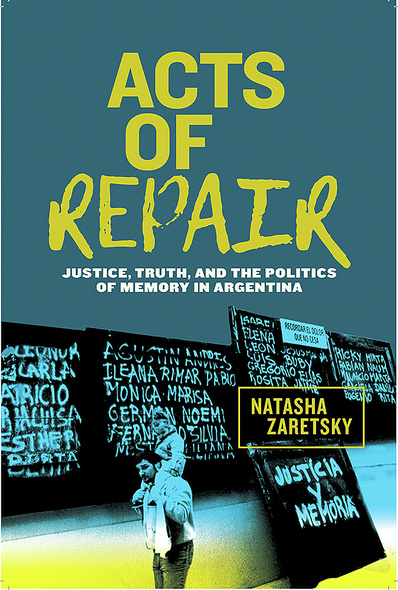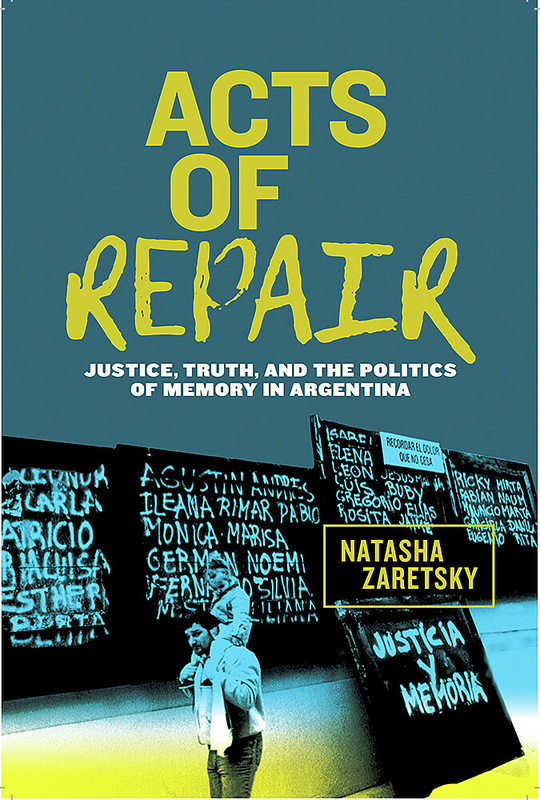
252 pages, 6 1/8 x 9 1/4
15 b-w images
Paperback
Release Date:18 Dec 2020
ISBN:9781978807426
Hardcover
Release Date:18 Dec 2020
ISBN:9781978807433
Acts of Repair
Justice, Truth, and the Politics of Memory in Argentina
Rutgers University Press
Acts of Repair explores how ordinary people grapple with decades of political violence and genocide in Argentina—a history that includes the Holocaust, the political repression of the 1976–1983 dictatorship, and the 1994 AMIA bombing. Although the struggle against impunity seems inevitably incomplete, Argentines have created possibilities for repair through cultural memory, yielding spaces for transformation and agency critical to personal and political recovery.
Acts of Repair compellingly emphasizes the value of narrative and testimony, using an ethnographic approach that is fine-grained and personal, dialogic and lyrical. This intimate book creates a nuanced frame for understanding immigrants, anti-Semitism, political culture, and memory practices, in Argentina and beyond.'
A masterful storylistener and storyteller, Natasha Zaretsky has written a heart-opening book that navigates the liminal spaces between silence and speech, erasure and memory, healing and trauma. The voices of her interlocutors sing and cry and are unforgettable. A stunning contribution to Latin American Jewish studies, as well as a beautiful enactment of the new soul-deep ethnography of the twenty-first century, this is a book that offers hope for humanity in fraught times.'
Acts of Repair presents a gripping account of a diversity of memorial sites and practices that emerged in Argentina in response to multilayered traumatic experiences of extreme political violence. Drawing on her ethnographic observations, in-depth personal interviews, and public testimonies, Zaretesky weaves personal voices into her insightful and sensitive study of the power of memory work to lead from political protest and demands for justice to human-rights trials and open venues for individual and collective processes of recovery. Acts of Repair will be of major interest to anyone interested in the comparative study of trauma, memory, human rights, and the intergenerational impact of genocide and terrorism.
Alumni Books: New titles from Dartmouth writers (November/December 2020)' round-up
https://dartmouthalumnimagazine.com/articles/alumni-books-november-december-2020
Drawing on anthropological work started at Princeton, Natasha Zaretsky *08 explores the everyday lives of people coping with political violence in Argentina. Acts of Repair: Justice, Truth, and the Politics of Memory in Argentina (Rutgers University Press) investigates how cultures exist with societal trauma and injustice, and how these wrongs might be repaired.
New Books Network: New Books in Genocide Studies' interview with Natasha Zaretsky
At the heart of Acts of Repair are the Argentine people who let Zaretsky into their lives and told her their stories. Despite the trauma that they have endured, they have devoted their lives to sharing their experiences, out of a profound sense of obligation to their fellow survivors, victims, and future generations of Argentines.'
Acts of Repair offers a broader canvas by situating the narrative within the larger history of European immigration to Argentina. That history, as illustrated in the book, created a national setting unlike any other in the world, as twentieth-century Argentina became a refuge for Jews fleeing the rise of Nazism and the aftermath of the Holocaust, as well as for Nazi officials, such as Adolf Eichmann, fleeing prosecution in Europe.
Acts of Repair compellingly emphasizes the value of narrative and testimony, using an ethnographic approach that is fine-grained and personal, dialogic and lyrical. This intimate book creates a nuanced frame for understanding immigrants, anti-Semitism, political culture, and memory practices, in Argentina and beyond.'
A masterful storylistener and storyteller, Natasha Zaretsky has written a heart-opening book that navigates the liminal spaces between silence and speech, erasure and memory, healing and trauma. The voices of her interlocutors sing and cry and are unforgettable. A stunning contribution to Latin American Jewish studies, as well as a beautiful enactment of the new soul-deep ethnography of the twenty-first century, this is a book that offers hope for humanity in fraught times.'
Acts of Repair presents a gripping account of a diversity of memorial sites and practices that emerged in Argentina in response to multilayered traumatic experiences of extreme political violence. Drawing on her ethnographic observations, in-depth personal interviews, and public testimonies, Zaretesky weaves personal voices into her insightful and sensitive study of the power of memory work to lead from political protest and demands for justice to human-rights trials and open venues for individual and collective processes of recovery. Acts of Repair will be of major interest to anyone interested in the comparative study of trauma, memory, human rights, and the intergenerational impact of genocide and terrorism.
Alumni Books: New titles from Dartmouth writers (November/December 2020)' round-up
https://dartmouthalumnimagazine.com/articles/alumni-books-november-december-2020
Drawing on anthropological work started at Princeton, Natasha Zaretsky *08 explores the everyday lives of people coping with political violence in Argentina. Acts of Repair: Justice, Truth, and the Politics of Memory in Argentina (Rutgers University Press) investigates how cultures exist with societal trauma and injustice, and how these wrongs might be repaired.
New Books Network: New Books in Genocide Studies' interview with Natasha Zaretsky
At the heart of Acts of Repair are the Argentine people who let Zaretsky into their lives and told her their stories. Despite the trauma that they have endured, they have devoted their lives to sharing their experiences, out of a profound sense of obligation to their fellow survivors, victims, and future generations of Argentines.'
Acts of Repair offers a broader canvas by situating the narrative within the larger history of European immigration to Argentina. That history, as illustrated in the book, created a national setting unlike any other in the world, as twentieth-century Argentina became a refuge for Jews fleeing the rise of Nazism and the aftermath of the Holocaust, as well as for Nazi officials, such as Adolf Eichmann, fleeing prosecution in Europe.
NATASHA ZARETSKY is a Clinical Associate Professor at New York University and a visiting scholar at the Rutgers University Center for the Study of Genocide at Human Rights, where she leads the Truth in the Americas initiative. She is the coeditor (with A. Levine) of Landscapes of Memory and Impunity: The Aftermath of the AMIA Bombing in Jewish Argentina.
Chronology
Introduction: Topographies of Violence
1 El Vacío: Trauma, Narrative, and the Boundaries of Coherence
2 Dialogic Memory and the Uneven Terrain of Justice
3 Disruption and Agency in the Public Sphere
4 Sites of Memory, Erasure, and Belonging
5 Nunca Más and the Intersections of Genocide, Loss, and Survival
6 On the Limits of Witnessing, On the Boundaries of Time
Conclusion: The Liminality of Repair
Acknowledgments
Notes
Bibliography
Index
Introduction: Topographies of Violence
1 El Vacío: Trauma, Narrative, and the Boundaries of Coherence
2 Dialogic Memory and the Uneven Terrain of Justice
3 Disruption and Agency in the Public Sphere
4 Sites of Memory, Erasure, and Belonging
5 Nunca Más and the Intersections of Genocide, Loss, and Survival
6 On the Limits of Witnessing, On the Boundaries of Time
Conclusion: The Liminality of Repair
Acknowledgments
Notes
Bibliography
Index






